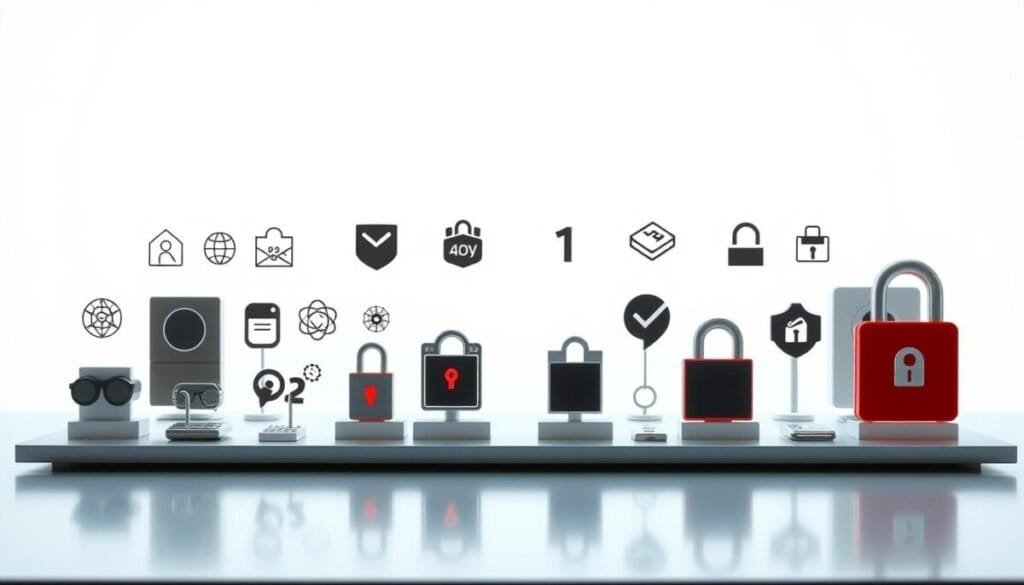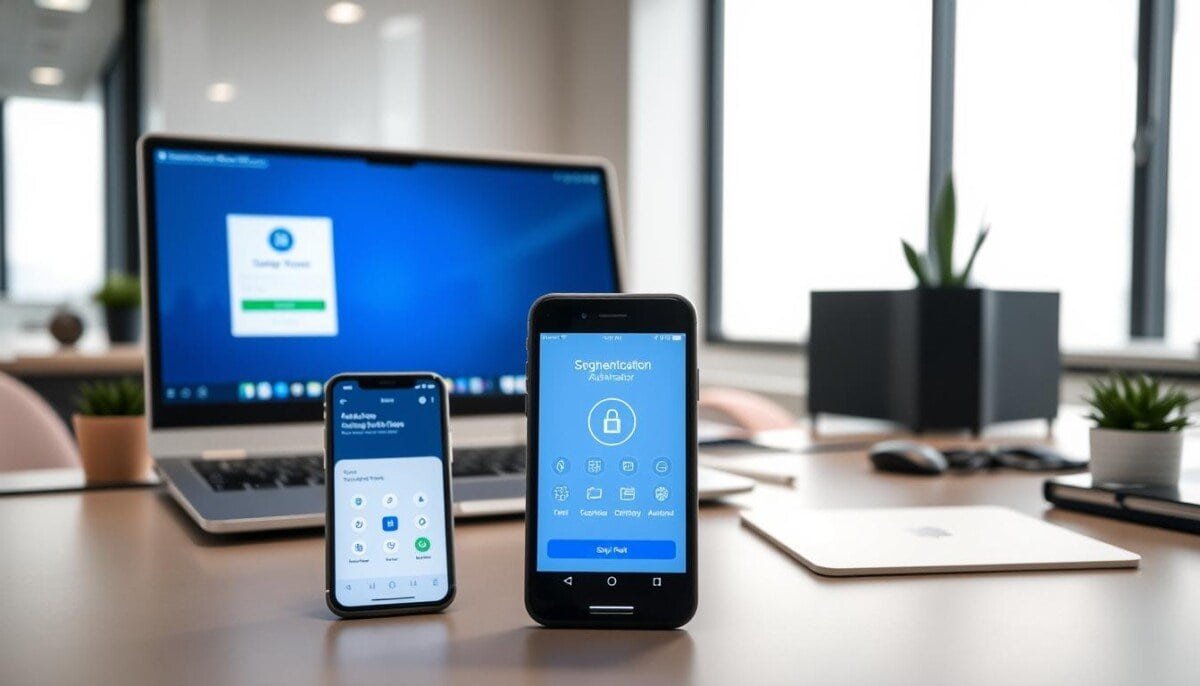Have you ever wondered if a single app is enough to keep your online accounts safe?
You rely on passwords, but those alone no longer suffice. Authenticator apps generate short, rotating codes and many add biometrics or push approvals to speed sign-ins. A hardware key can give you offline, phishing-resistant protection for high-risk accounts.
The right setup depends on the device mix you use and how sensitive your data is. Cross-platform options like Authy offer encrypted backups and multi-device sync, while enterprise platforms add policy controls and logging. You will learn practical steps to move from a basic method to a layered, resilient approach with minimal friction.
If you run into common setup problems, a helpful guide explains fixes and recovery tips. See a quick walkthrough for resolving failures and keeping backup codes current at common 2FA problems and solutions.
Key Takeaways
- You will see why moving beyond one app strengthens account protection.
- Rotating codes, biometrics, and push approvals reduce takeover risk.
- Choose apps with offline codes and secure backup for reliable access.
- Hardware keys give the strongest phishing resistance for sensitive accounts.
- Enterprise options add controls, logging, and Conditional Access for teams.
Why look beyond Google Authenticator in the present security landscape
Your password alone is fragile. Many attacks start by phished or reused passwords. An extra layer that issues short codes or push approvals stops most takeover attempts.
Google Authenticator is simple, free, and widely compatible. It now offers cloud sync and biometric locks for convenience. Still, it stays mobile-only and lacks advanced organization or desktop access that some users need.
Consider what you want from an authentication setup. Do you need encrypted backups, multi-device sync, or a desktop client? Do you prefer push approvals or biometric prompts for daily ease?
- Backups and export options prevent lock-in when you switch devices.
- Push, biometrics, and recovery flows cut friction without hurting security.
- Work accounts may need admin controls, reporting, and policy enforcement.
- Weigh privacy tradeoffs like phone-number ties or ecosystem sync.
How we evaluate authenticator apps for this Product Roundup
We judge each app by how well it defends your accounts and fits your daily workflow. That means testing core standards, recovery paths, admin controls, and the simple moments you sign in.
Security model and standards matter first. We verify RFC 6238 TOTP/HOTP support and whether biometrics lock the app or approve sign-ins. Offline code generation is tested for times you lack service.
Platform coverage and backups affect portability. We check multi-device sync, encrypted cloud backups, and export paths so you avoid lockouts when you replace devices. We also note if an app ties to a phone number or proprietary account.
- We review admin-grade features: policy controls, audit logs, and Conditional Access for identity management.
- We score user experience: push notifications, approval flows, verification speed, and recovery steps.
- We test limits on multi-device enrollments and how migration or export works.
For troubleshooting and setup tips, see our quick guide on login approvals help. Use an app that matches your needs for security, convenience, and long-term management.
Top consumer-friendly authenticator apps to upgrade your user experience
Pick an app that matches how you sign in day to day and which devices you use most. A good choice balances convenience, secure backup, and easy recovery. Below are popular consumer options with clear tradeoffs for users.
Authy by Twilio works on Android and iOS. It gives multi-device sync and encrypted cloud backup. You get offline codes and biometric locks. Note: it ties accounts to a phone number and does not offer easy export.
2Stable Authenticator is Apple-first. It syncs via iCloud to iPhone, iPad, Mac, and Apple Watch. The app supports biometrics and encrypted backups. A free plan limits you to two accounts; full features run about $50 per year.
Step Two keeps things simple on Apple devices. It syncs tokens via iCloud and offers up to ten accounts for free. You can unlock unlimited accounts with a $10 one-time purchase.
LastPass Authenticator supports TOTP and biometric locks. It adds push approvals when paired with a LastPass account and uses backup tied to that account. It is mobile-only and lacks a desktop client.
- Choose Authy for multi-device sync, encrypted cloud backup, and offline codes.
- Prefer Apple features with 2Stable for Watch widgets and iCloud sync.
- Pick Step Two for a no-frills Apple option and a fair one-time price.
- Use LastPass if you already rely on LastPass and want push approvals.
Enterprise-grade 2FA and MFA platforms with admin controls
Enterprise identity platforms give admins the tools to enforce access rules and monitor activity across teams. You need solutions that scale, offer reporting, and let you set clear policies for employees and accounts.
Cisco Duo Mobile delivers fast push approvals, adaptive access checks, and detailed logging. Admins get policy controls and flexible enrollment. Pricing ranges from free to about $9 per user per month.
Cisco Duo Mobile
Features: push approvals, conditional access, logging and reporting. Use it when you want broad factor support and strong audit trails.
Microsoft Authenticator with Entra ID
Microsoft Authenticator ties tightly into Azure AD. It provides centralized management, Conditional Access, and simple onboarding across devices.
NordPass Authenticator
Bundled with NordPass Business, this option lets admins enforce policies and monitor logs while managing TOTP inside the vault. Pricing starts near $1.79–$1.99 per user per month.
Daito Authenticator
Daito offers shared vaults, granular permissions, activity logs, and both web and mobile access. It suits teams that must share codes securely; paid plans start at $19 for 3 users.
- Align policy scope, reporting, and audit trails with compliance needs.
- Plan enrollment, recovery, and offboarding so tokens stay under management.
- Confirm cost per user and map integrations to your identity stack for smooth access and better data visibility.
| Platform | Key features | Admin controls | Starting price |
|---|---|---|---|
| Cisco Duo Mobile | Push approvals, adaptive access, logging | Conditional access, enrollment policies, audit logs | Free – ~$9/user/mo |
| Microsoft Authenticator | Push, Conditional Access, Azure AD integration | Central admin in Entra ID, cross-platform management | Included with Azure AD tiers |
| NordPass Authenticator | Vault-based TOTP, policy enforcement, logs | Admin policy oversight, monitoring | ~$1.79–$1.99/user/mo |
| Daito | Shared vaults, granular permissions, activity logs | Per-user and per-vault permissions, audit trails | $19 for 3 users (after trial) |
Hardware-backed options for the highest level of protection
Hardware keys raise the bar for account safety by keeping secrets off phones and servers.
Yubico Authenticator paired with a YubiKey generates offline codes and resists phishing and many malware attacks.
You get durable, portable devices that work across many platforms and devices. They suit high-risk accounts and regulated environments.
Yubico Authenticator with YubiKey
Offline code generation means your codes remain usable without network access. The key stores secrets in hardware, which lowers token theft risk.
When to deploy security keys versus apps
- Use keys to reach a higher security level for admins and critical roles.
- Keep apps for low-risk accounts to balance cost and convenience.
- Plan inventory, issuance, and recovery so device loss won’t disrupt operations.
- Confirm platform compatibility before a wide rollout across your device fleet.
- Blend hardware-backed options with apps to match risk, streamline authentication, and improve user adoption.
Two-Factor Authentication Tools Beyond Google Authenticator

Many apps now combine quick approvals with enterprise controls to fit varied workflows. You get features that go past simple code generation. These include push notifications, shared vaults, and adaptive policies for risky sign-ins.
Duo and Microsoft Authenticator provide fast push approvals and Conditional Access controls for teams. Daito adds shared vaults and fine-grained permissions so groups can manage codes securely.
Gaps to watch
- Export limits: Some apps make migration slow or manual, so check export capability before you commit.
- Ecosystem lock-in: Sync may depend on a specific provider account, which affects portability and privacy.
- Mobile-only constraints: If you need desktop access, confirm an app has a web or desktop client.
- Privacy tradeoffs: Features like phone-number recovery can ease setup but tie your account to a number.
Match richer features to your most critical users. Compare how each app handles notifications, approvals, and recovery when devices change. That helps you pick the best options for both convenience and safety.
Pricing, platforms, and features at a glance
Costs and device support shape which app or service makes the most sense for you. Pick a consumer option if you want simple backup and multi-device access. Choose a paid plan when you need admin controls and logs.
Consumer tradeoffs: Authy is free, offers encrypted cloud backup and multi-device sync, but it has no easy export. 2Stable gives a limited free tier and about $50 per year for full iCloud sync. Step Two supports up to ten accounts for free and a $10 one-time upgrade for more.
Business tiers and value drivers
For a company, compare per-user pricing and management features. Duo ranges from free to about $9 per user per month and adds admin controls and reporting. Microsoft Authenticator is free and integrates with Entra ID under Microsoft licensing. NordPass includes an authenticator in NordPass Business at roughly $1.79–$1.99 per user per month. Daito starts at $19 for 3 users and offers a 14-day free trial.
| Product | Key point | Best for |
|---|---|---|
| Authy | Free, cloud backup | Individual accounts |
| 2Stable / Step Two | Paid upgrades for more accounts | Apple-focused users |
| Duo / NordPass / Daito | Paid plans, admin logs | business and company management |
- Start free with Authy or Step Two and scale to paid plans when needed.
- Confirm platform coverage so the app works on every device your company supports.
- Weigh cloud backup, multi-device sync, and account recovery against your data risk.
- Check management and reporting if you must track accounts and enforce policies.
- For password storage options for families and small teams, see password managers.
Which 2FA solution fits your use case

Map your users and apps, then match risk levels to available verification options.
Individuals and creators: seamless backups and multi-device access
Pick a simple, recoverable solution if you sign in across phones and tablets. Authy gives encrypted backups and multi-device sync so you can recover tokens quickly.
Apple-focused users may prefer 2Stable or Step Two for iCloud sync and device continuity. These keep day-to-day access smooth while protecting your identity and credentials.
SMBs and distributed teams: shared access, audit trails, and policy enforcement
Choose tools that support shared vaults and clear audit logs. Daito offers granular permissions for teams and helps you manage shared secrets safely.
Cisco Duo adds push approvals, policy controls, and reporting so admins can enforce access rules and track events across the business.
Regulated enterprises: adaptive MFA, logging, and hardware-backed assurance
Combine centralized identity controls with hardware keys for high-risk roles. Microsoft Authenticator with Entra ID enables Conditional Access and centralized verification across your infrastructure.
Add YubiKeys for admins and critical users to gain phishing-resistant, offline assurance when compliance demands it.
- You can phase rollout by group to limit friction and test support paths.
- Balance user needs for fast access with the controls your infrastructure requires.
- Confirm integrations so the solution works with core apps and sign-in flows.
| Use case | Recommended solution | Key benefit | When to deploy |
|---|---|---|---|
| Individuals & creators | Authy, 2Stable, Step Two | Encrypted backups, multi-device sync | Personal accounts and content creators |
| SMBs & distributed teams | Daito, Cisco Duo | Shared vaults, audit trails, policy enforcement | Small companies and teams needing shared access |
| Regulated enterprises | Microsoft Authenticator + YubiKey | Conditional Access, centralized logs, hardware-backed assurance | High compliance needs and admin roles |
| Mixed environment | Layered stack | Apps for daily use; keys for critical accounts | When you must balance convenience with strong security |
Secure your online accounts today with the right authenticator app
Make protection practical by securing just a few key accounts first and expanding from there. Start with email, banking, and any account that can reset other passwords.
Pick an authenticator app with reliable backup and cloud restore so device upgrades do not lock you out. Consider Authy for encrypted cloud backup, 2Stable or Step Two for Apple sync, and Microsoft or Duo for push and policy controls.
Record recovery codes, use unique strong passwords, and enable biometrics and screen locks to close weak links. Add a YubiKey or similar hardware key for your highest risk accounts to boost phishing-resistant protection.
Set a calendar reminder to audit accounts and device trust. Start small, act now, and grow coverage until every important account has better multi-factor authentication and smoother access.



